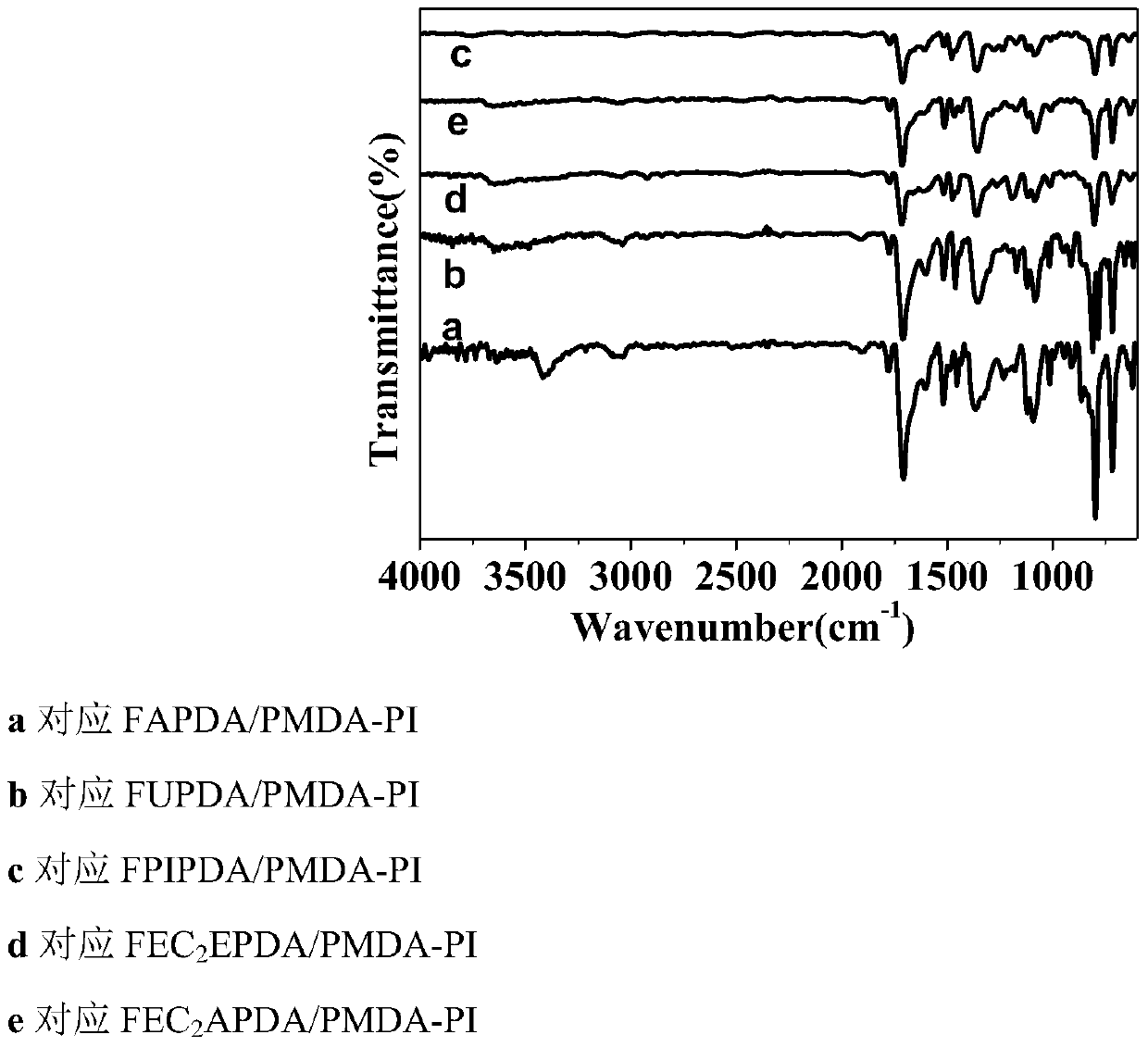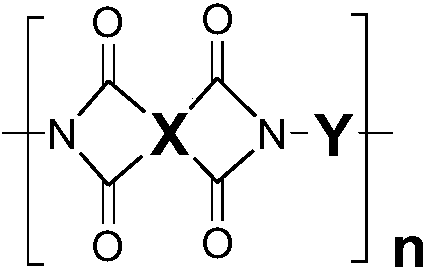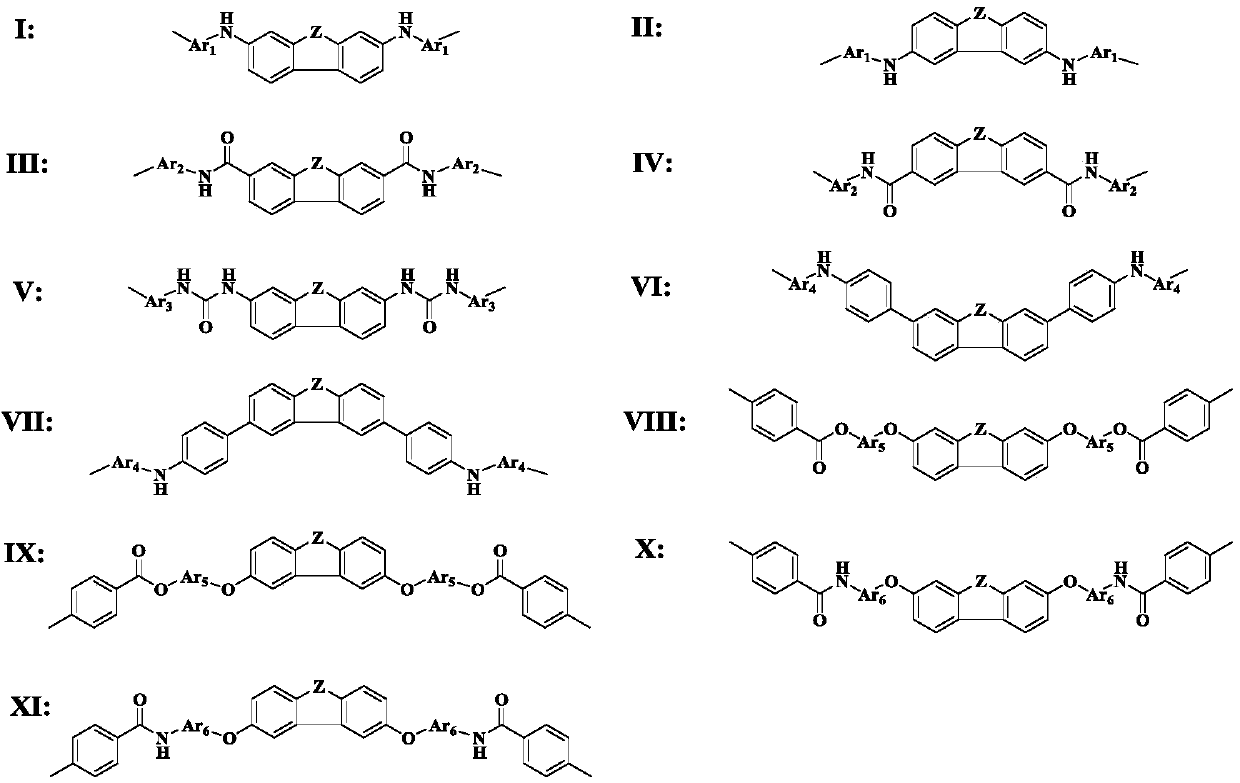A kind of polyimide containing fluorene or fluorenone structure and its preparation method and application
A technology of polyimide and polyimide film, applied in the field of material science, to achieve high glass transition temperature and thermal stability, various preparation processes, and excellent barrier properties
- Summary
- Abstract
- Description
- Claims
- Application Information
AI Technical Summary
Problems solved by technology
Method used
Image
Examples
Embodiment 1
[0036] At room temperature, 4.3450g (0.01mol) N 2 ,N 7 -bis(4-aminophenyl)-9H-fluorene-2,7-dicarboxamide (FAPDA) and 43.51g (46.1ml) N,N-dimethylformamide were added to a 100ml three-necked flask, argon was introduced, and stirred , after completely dissolving, add 2.1812g (0.01mol) Pyromellitic dianhydride (pyromellitic dianhydride, PMDA), continue to stir and react for 6h, and obtain a homogeneous, transparent, viscous polyamic acid glue. Then scrape and coat the polyamic acid solution on the glass plate, then place the glass plate in a vacuum oven, vacuumize, and the heating program is as follows: the temperature is raised from room temperature to 100°C, and then the whole process of constant temperature is 1h → 100°C is heated to 200°C, and then the whole process is constant Process 1h→200°C, heat up to 300°C and then keep constant temperature. The whole process 1h→300°C, heat up to 420°C, then keep constant temperature. The whole process is 1.5h. After cooling, the polyi...
Embodiment 2
[0040] At room temperature, 4.78g (0.01mol) 1,1'-(9-oxo-9H-fluorene-2,7-diyl)bis(3-(4-aminophenyl)urea) (FUPDA) and 45.51g (48.8ml )N,N-Dimethylformamide was added to a 100ml three-necked flask, argon was introduced, stirred, and after it was completely dissolved, 2.1812g (0.01mol) of Pyromellitic dianhydride (pyromellitic dianhydride, PMDA) was added, and continued After stirring for 6 hours, a homogeneous, transparent and viscous polyamic acid solution was obtained. Then scrape and coat the polyamic acid solution on the glass plate, then place the glass plate in a vacuum oven, vacuumize, and the heating program is as follows: the temperature is raised from room temperature to 100°C, and then the whole process of constant temperature is 1h → 100°C is heated to 200°C, and then the whole process is constant Process 1h→200°C, heat up to 300°C and then keep constant temperature. The whole process 1h→300°C, heat up to 420°C, then keep constant temperature. The whole process is 1.5...
Embodiment 3
[0044] At room temperature, 5.3068g (0.01mol) N 1 ,N 1 '-((9H-fluorene-2,7-diyl)bis(4,1-phenylene))bis(benzene-1,4-diamine)(FPIPDA) and 49.92g (52.85ml) N,N-dimethyl Formamide was added to a 100ml three-necked flask, argon was introduced, stirred, and after it was completely dissolved, 2.1812g (0.01mol) of pyromellitic dianhydride (pyromellitic dianhydride, PMDA) was added, and the stirring reaction was continued for 6h to obtain a homogeneous, Transparent, viscous polyamic acid solution. Then scrape and coat the polyamic acid solution on the glass plate, then place the glass plate in a vacuum oven, vacuumize, and the heating program is as follows: the temperature is raised from room temperature to 100°C, and then the whole process of constant temperature is 1h → 100°C is heated to 200°C, and then the whole process is constant Process 1h→200°C, heat up to 300°C and then keep constant temperature. The whole process 1h→300°C, heat up to 420°C, then keep constant temperature. T...
PUM
 Login to View More
Login to View More Abstract
Description
Claims
Application Information
 Login to View More
Login to View More - R&D
- Intellectual Property
- Life Sciences
- Materials
- Tech Scout
- Unparalleled Data Quality
- Higher Quality Content
- 60% Fewer Hallucinations
Browse by: Latest US Patents, China's latest patents, Technical Efficacy Thesaurus, Application Domain, Technology Topic, Popular Technical Reports.
© 2025 PatSnap. All rights reserved.Legal|Privacy policy|Modern Slavery Act Transparency Statement|Sitemap|About US| Contact US: help@patsnap.com



